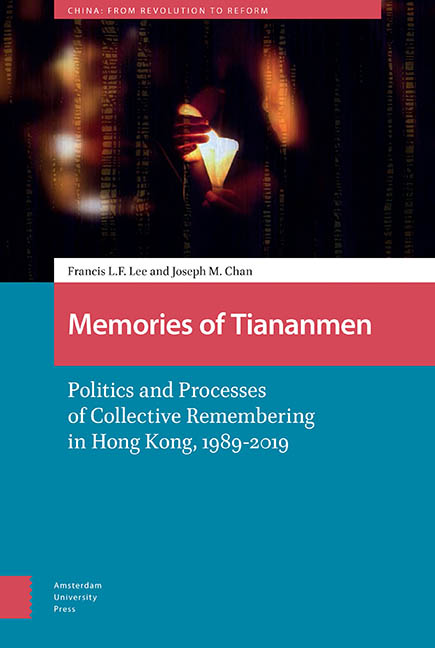Book contents
- Frontmatter
- Contents
- List of Figures and Tables
- Acknowledgments
- List of Abbreviations
- 1 Introduction
- 2 Memory Formation and the Valorization of Commemoration
- 3 Memory Mobilization
- 4 Intergenerational Memory Transmission
- 5 The Struggle for Memory Institutionalization
- 6 The Challenge of Localism and Memory Repair
- 7 Changing Attitudes toward Tiananmen?
- 8 Digital Media and Memory Balkanization
- 9 Conclusion
- Epilogue
- Appendix
- References
- Index
9 - Conclusion
Published online by Cambridge University Press: 16 July 2022
- Frontmatter
- Contents
- List of Figures and Tables
- Acknowledgments
- List of Abbreviations
- 1 Introduction
- 2 Memory Formation and the Valorization of Commemoration
- 3 Memory Mobilization
- 4 Intergenerational Memory Transmission
- 5 The Struggle for Memory Institutionalization
- 6 The Challenge of Localism and Memory Repair
- 7 Changing Attitudes toward Tiananmen?
- 8 Digital Media and Memory Balkanization
- 9 Conclusion
- Epilogue
- Appendix
- References
- Index
Summary
Abstract
Chapter 9 concludes the book by further highlighting some of the core findings in the study. It discusses what the analysis has taught us about the collective memory processes and the development of society and politics in Hong Kong.
Keywords: persistence of collective memory, memory and time, international dimension of collective remembering
When discussing the question of why Hong Kong people have kept remembering the Tiananmen crackdown for decades, citizens who experienced the events in 1989 may sometimes simply refer to how unforgettable the student movement and the crackdown were. The events in 1989 indeed left a deep emotional imprint on many Hong Kong people. However, not all momentous events in the world lead to persistent collective remembering. Collective remembering does not arise naturally. It needs to be explained.
This book has provided a process-based account of the formation, contestation, and evolution of collective remembering of Tiananmen in Hong Kong in the three decades after the event. To recapitulate briefly, collective remembering of a historical event typically arise when ongoing events or social changes render the event publicly relevant. A strong collective memory about Tiananmen and remembering as a moral imperative did not arise until right before the handover. Uncertainty regarding the society's future under communist rule provided the context within which commemorating the Tiananmen crackdown was valorized into something signifying the society's freedom and the moral integrity of its citizens.
After the moral norm of remembering was established, the memory entrepreneurs were largely capable of perpetuating the collective memory and defending it against attempts to undermine it by the state. They did so through setting up and maintaining certain discursive bottom lines regarding the issue of Tiananmen, condemning the transgressive statements occasionally made by officials and pro-government public figures, regularly recalling people's memory of the Tiananmen Incident and mobilizing people to participate in the annual vigil, transmitting knowledge about the Tiananmen crackdown to the next generation, and trying to establish enduring channels and sites for communicating and preserving collective memory.
The significance of a collective memory can change as social and political conditions evolve.
- Type
- Chapter
- Information
- Memories of TiananmenPolitics and Processes of Collective Remembering in Hong Kong, 1989–2019, pp. 289 - 312Publisher: Amsterdam University PressPrint publication year: 2021



